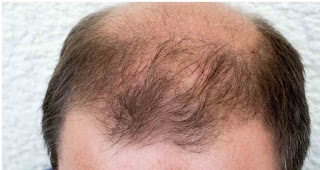Androgenetic
alopecia is a common form of hair loss in both men and women. In men, this
condition is also known as male-pattern baldness. Hair lost in a well-defined
pattern, beginning above both temples. Over time, the hair line recedes to form
a characteristic ‘M’ shape. Hair thins, and lost at the top of the head,
often progressing or complete baldness. It is a combination of hormones, and
genetic predisposition. A similar type of hair loss in women, female pattern
hair loss, results in thinning hair on the mid-frontal area of the scalp and is
generally less severe than occurs in males.
Etiology
Male-pattern
hair loss is an inherited condition, caused by a genetically determined
sensitivity to the effects of dihydrotestosterone, DHT, in some areas of the
scalp.
Pathogenesis
Polygenic
inheritance; variable penetrance. The hair follicles have increased numerous
androgen receptors as well as increased activity of 5-a-reductase type II,
leading to increased androgen sensitivity. Dihydrotestosterone also causes
shift to telogen hairs. In female pattern hair loss, there may be an increased
sensitivity to circulating androgen, as androgen levels are usually within
normal limits.
Clinical
features
Thinning of
hair without scalp disease. Male pattern and Female pattern.
The presence
of whisker hair at the temples may the first sign of this condition. The
follicles produce finer, shorter and lighter or virtually unpigmented terminal
hair, until a complete cessation of terminal hair growth results. Miniaturized
hairs become increasingly evident, replacing coarser intermediate or terminal
hair.
In males, the
replacement of terminal by smaller hair occurs in a distinctive pattern that
spares the posterior and lateral scalp margins, even in the most advanced cases
and in old age. There is a recession of the anterior and bitemporal hairline,
so that the forehead becomes high, followed by balding of the vertex. The loss
is thus more noticeable at the vertex and in the bitemporal regions of the
scalp. The rate of hair loss varies from person to person, depending on the
hereditary factors.
It has been
recently suggested that bald men are more likely to have a heart attack and prostate
cancer than with a full head of hair.
HOMEOPATHY
MEDICINES
Homoeopathy today is a
growing system and is being practiced all over the world. Its strength lies in
its evident effectiveness as it takes a holistic approach towards the sick
individual through promotion of inner balance at mental, emotional, spiritual
and physical levels. When Androgenetic alopecia is concerned there are many
effective medicines are available in Homoeopathy, but the selection depends
upon the individuality of the patient, considering the mental and physical
symptoms.
ARNICA
MONTANA
Controls hair
fall and promotes hair growth. Improve the blood circulation to the hair root.
It enriches the scalp with nutrients which help to cure and control dandruff.
It is a natural coolant, and hence prevents scalp disease.
BARYTA
CARBONICA
Hair falls
from vertex and moustache. Baldness, especially on crown in young people. Scalp
very sensitive to touch, worse from scratching and touch.
FLOURIC ACID
Falling out
of hair after fevers. Itching of the
scalp. Brittle hairs. Large patches
entirely denuded of hair. New hair dry and break off. Often hair matts at the
end. Baldness.
GRAPHITES
Falling of
hair from sides of the head, and vertex. Hair falls out from beard, and
eyebrows. Dry, tangled, matted or brittle hair. Bald spots. Perspiration of scalp. Dandruff like milk
crusts. Premature greying of hair.
LYCOPODIUM
CLAVATUM
Hair falls
out from temples and vertex. Premature greying of hair. Hair falls off after
abdominal affections. Hair falling in nursing mother. After parturition, with
burning scalding, itching of the scalp. Hair falls out on getting warm from
exercise during the day. Dandruff.
NATRUM
MURIATICUM
Falling of
hair during pregnancy, and after childbirth. Hair comes out excess while
combing. Falling off hair from forepart of head, moustache, temples, and beard.
Scalp very sensitive. Face shining as if greasy. Losing hair after acute headache. Dandruff on
occiput.
PHOSPHORUS
Hair falls
after mental emotion or sickness. Falling of hair in large bunches on the
tufts, occiput, forehead, and on the sides above the ear. Round patches on
scalp completely deprived of hair. The denuded scalp looks clear white and
smooth. The roots of hair seem to be dry. Copious dandruff, fall out in clouds.
Itching of the scalp.
SILICEA
Losing hair
in bunches. Falling of hair after severe acute diseases, and nervous or
hysterical headache. Falling of hair from the back of the scalp. Premature
baldness.





No comments:
Post a Comment